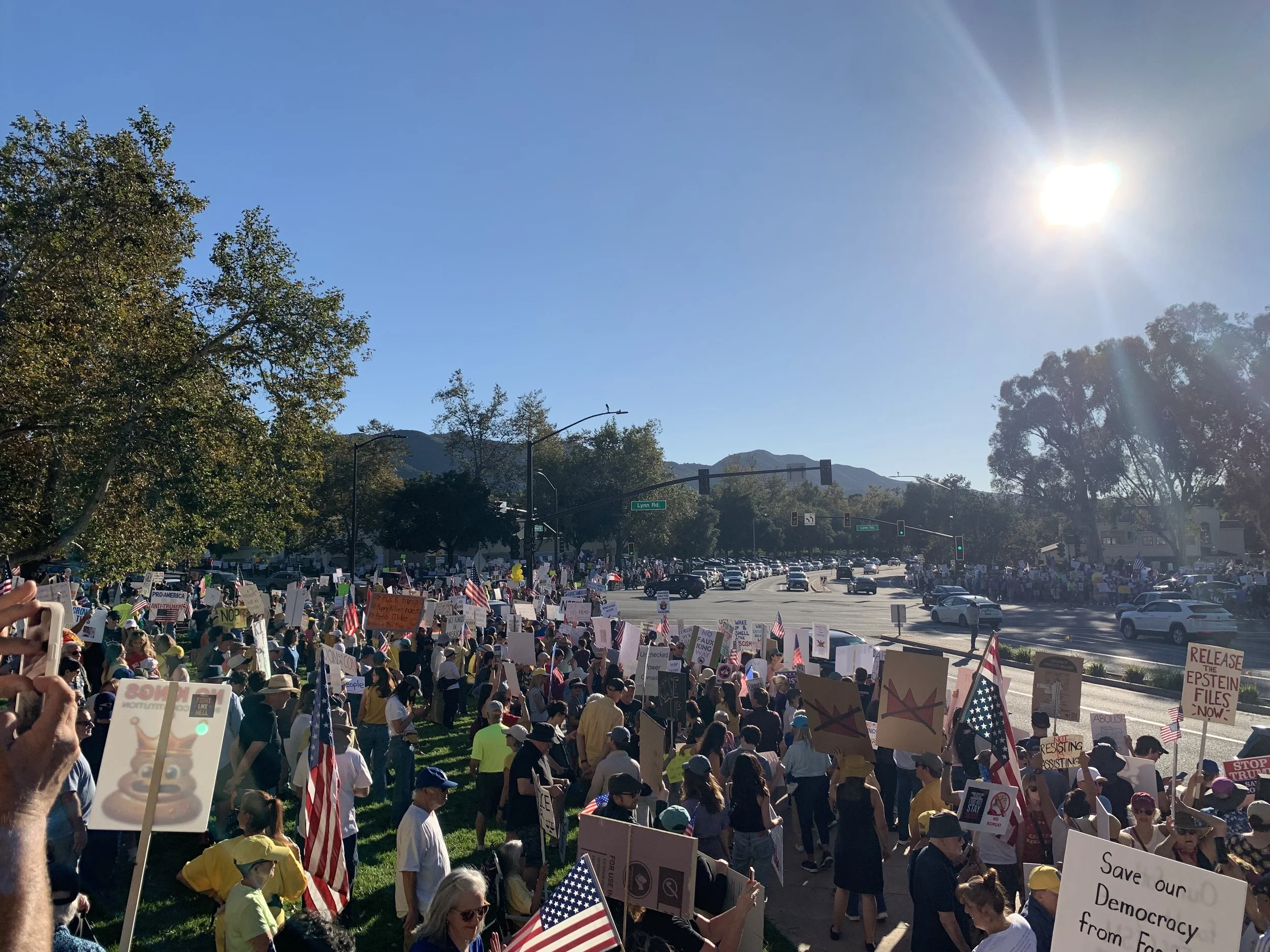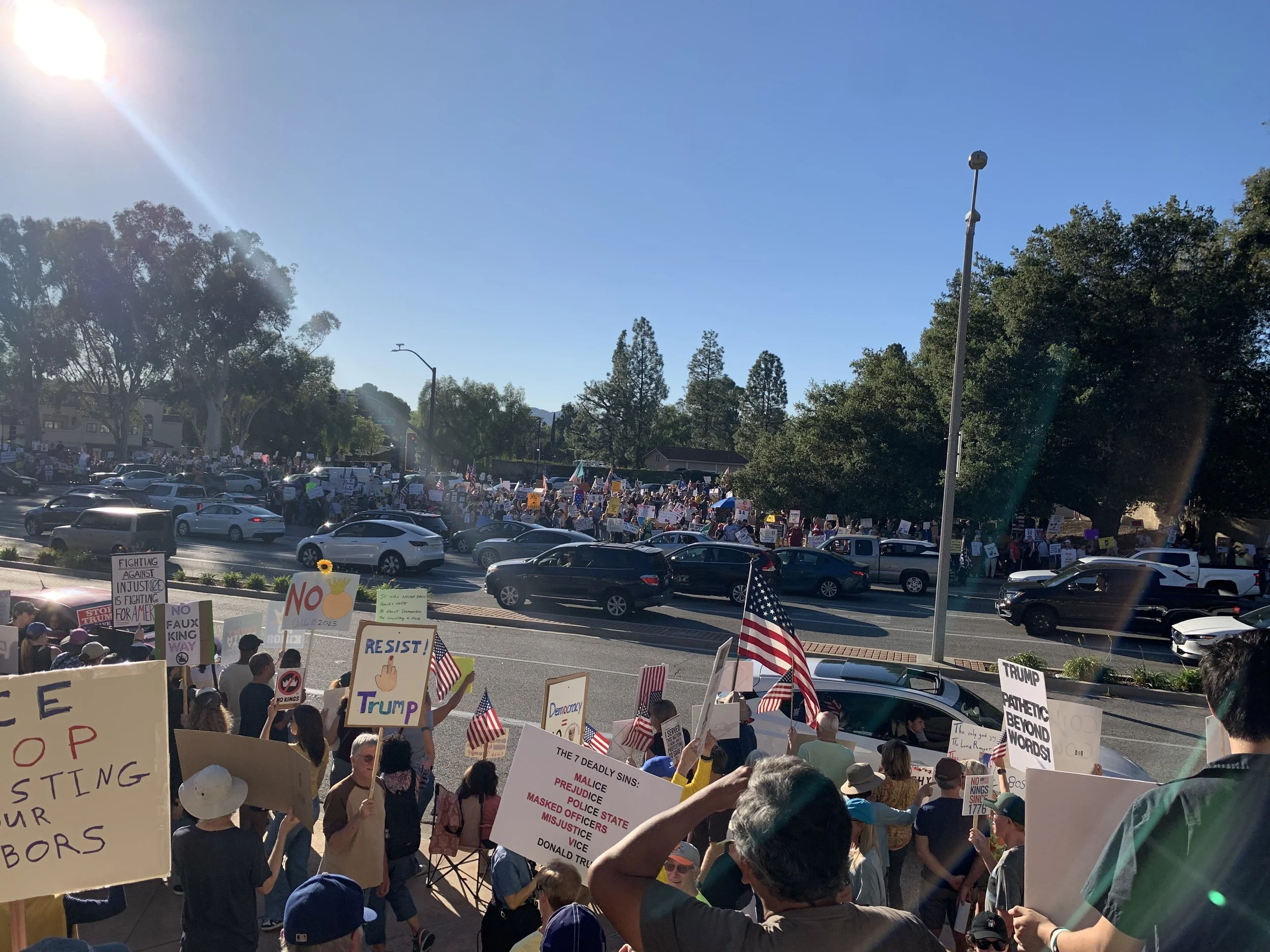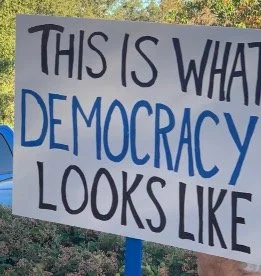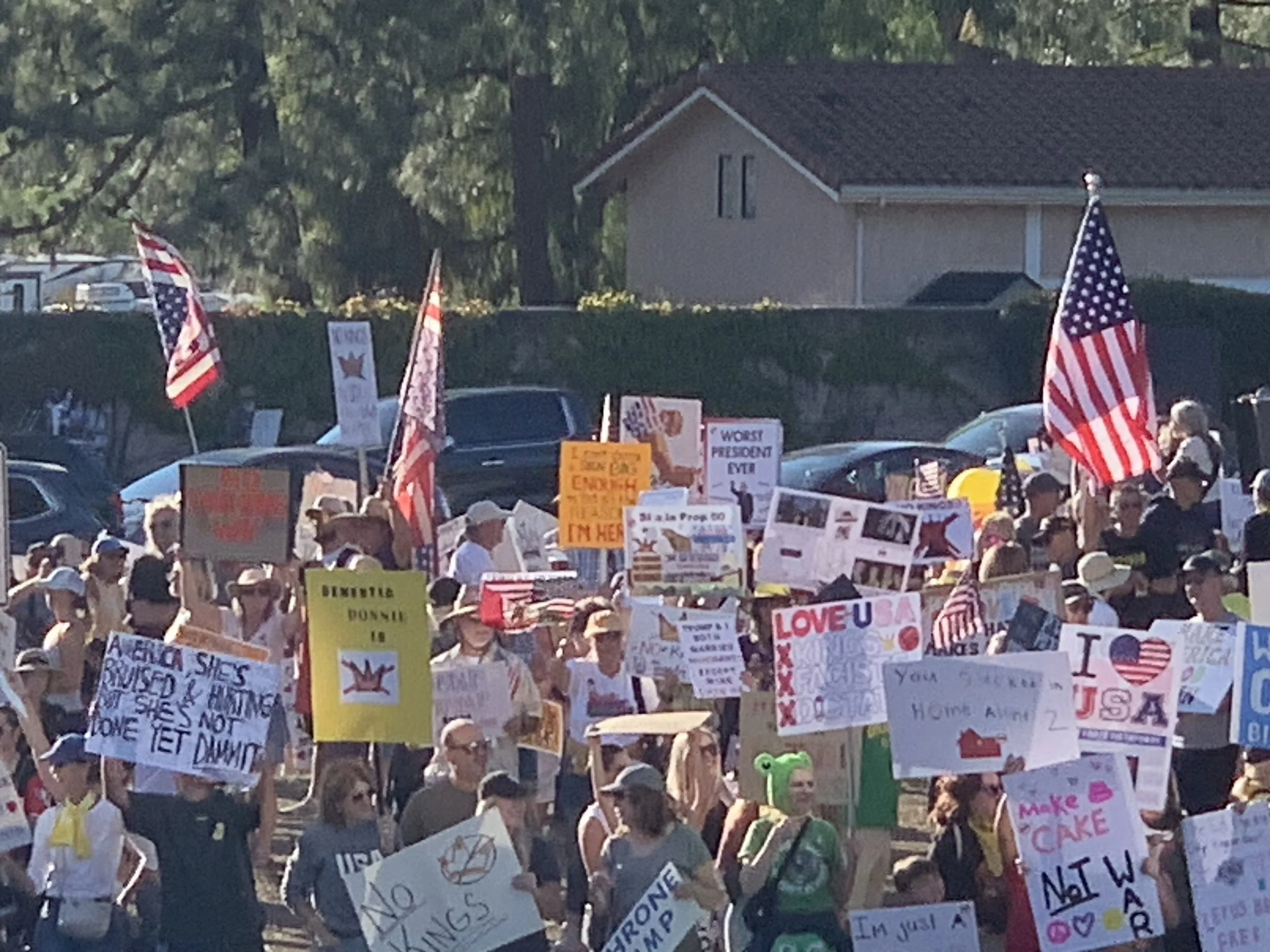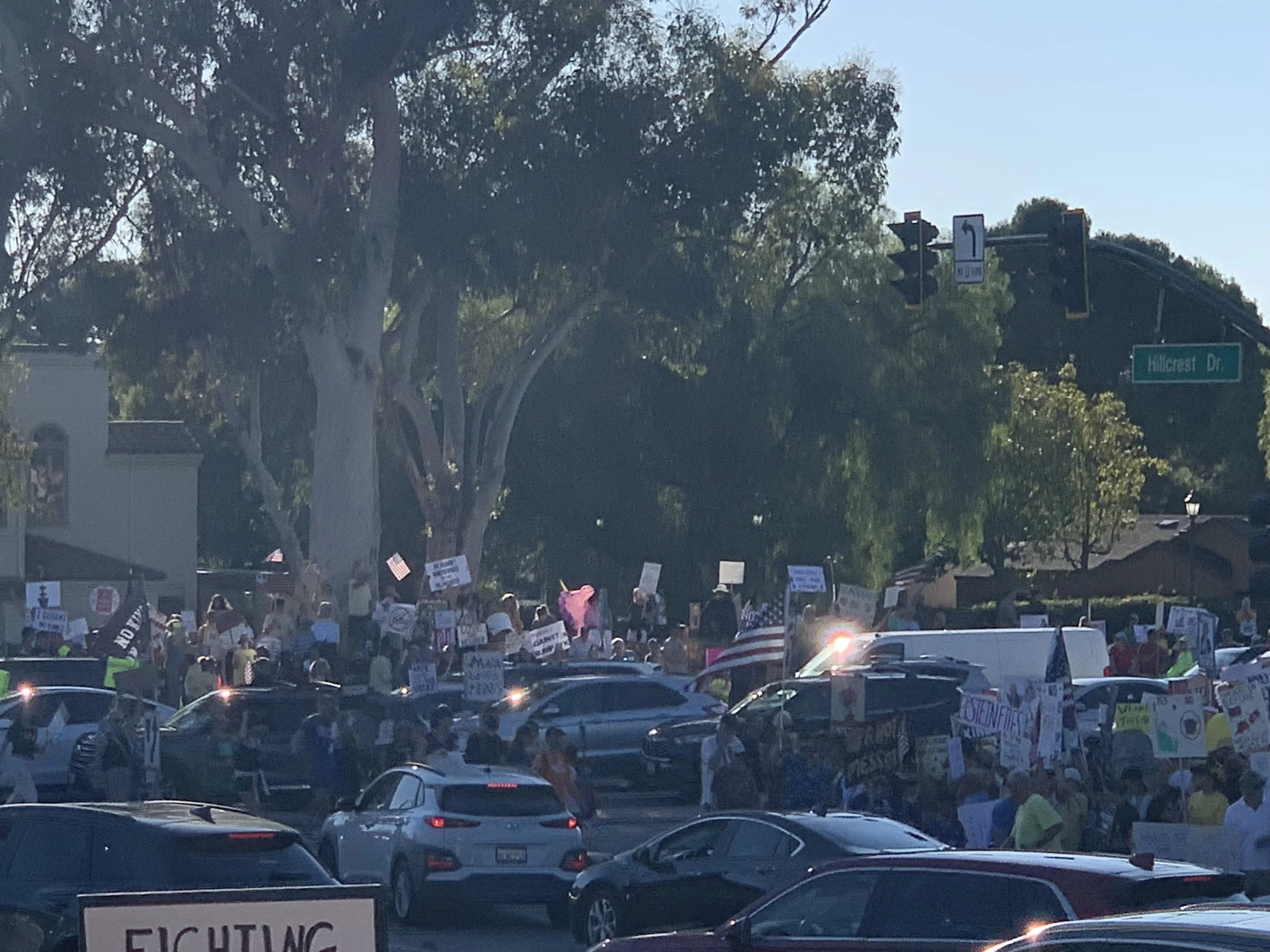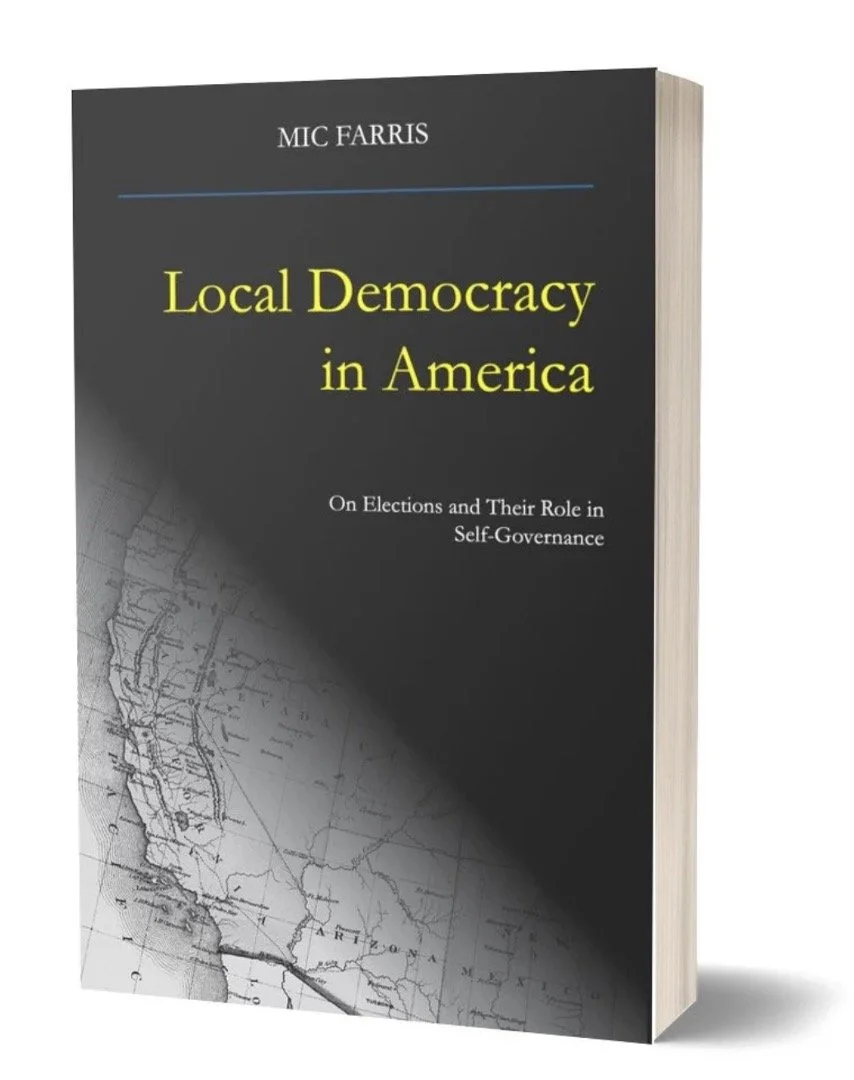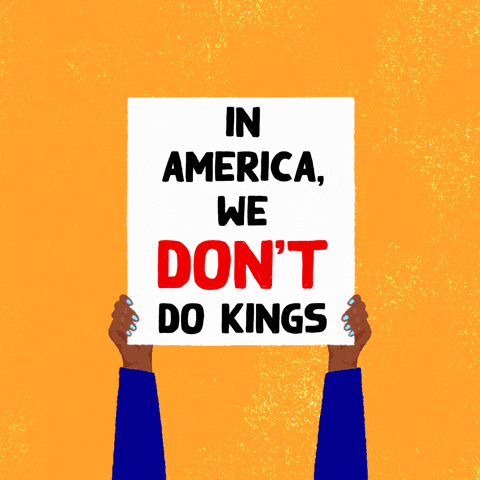No Kings 2.0
A tribute to the largest demonstration in support of American democracy in our country’s history.
If you’d like these posts delivered directly to you, subscribe to the Decisions newsletter now!
No Kings demonstration in Thousand Oaks, CA, October 18, 2025. Photo | Mic Farris.
On Tyranny
Professor Timothy Snyder is a preeminent scholar of 20th-century European history and the impact of policies that led to and fought against totalitarianism. Seeing the turn the United States took from the 2016 election of Donald Trump, Snyder provided a warning, but also a set of lessons for us to use to protect our democratic system: [1]
The Founding Fathers tried to protect us from the threat they knew, the tyranny that overcame ancient democracy. Today, our political order faces new threats, not unlike the totalitarianism of the twentieth century. We are no wiser than the Europeans who saw democracy yield to fascism, Nazism, or communism. Our one advantage is that we might learn from their experience.
These lessons were laid out eight years ago in his book On Tyranny, so they are not new, but worthy of being reminded of at this moment. You can get a copy of Timothy Snyder’s book here (and his book is highlighted in the Narratives section of this newsletter). [2]
Here is an abridged list of Professor Snyder’s lessons: [3]
1. Do not obey in advance. Most of the power of authoritarianism is freely given. In times like these, individuals think ahead about what a more repressive government will want, and then offer themselves without being asked. A citizen who adapts in this way is teaching power what it can do.
2. Defend institutions. It is institutions that help us to preserve decency. So choose an institution you care about – a court, a newspaper, a law, a labor union – and take its side.
3. Beware the one-party state. Support the multi-party system and defend the rules of democratic elections.
4. Take responsibility for the face of the world. Notice the swastikas and other signs of hate. Do not look away, and do not get used to them. Remove them yourself and set an example for others to do so.
5. Remember professional ethics. When political leaders set a negative example, professional commitments to just practice become important.
6. Be wary of paramilitaries. When the men with guns who have always claimed to be against the system start wearing uniforms and marching around with torches and pictures of a Leader, the end is nigh. When the pro-leader paramilitary and the official police and military intermingle, the end has come.
7. Be reflective if you must be armed. If you carry a weapon in public service, God bless you and keep you. But know that evils of the past involved policemen and soldiers finding themselves, one day, doing irregular things. Be ready to say no.
8. Stand out. The moment you set an example, the spell of the status quo is broken, and others will follow.
9. Be kind to our language. Avoid pronouncing the phrases everyone else does. Make an effort to separate yourself from the internet. Read books.
10. Believe in truth. To abandon facts is to abandon freedom. If nothing is true, then no one can criticize power because there is no basis upon which to do so. If nothing is true, then all is spectacle. The biggest wallet pays for the most blinding lights.
11. Investigate. Figure things out for yourself. Spend more time with long articles. Take responsibility for what you communicate to others.
12. Make eye contact and small talk. This is not just polite. It is part of being a citizen and a responsible member of society.
13. Practice corporeal politics. Power wants your body softening in your chair and your emotions dissipating on the screen. Get outside. Put your body in unfamiliar places with unfamiliar people. Make new friends and march with them.
14. Establish a private life. Nastier rulers will use what they know about you to push you around. Remember that email is skywriting. Consider using alternative forms of the Internet, or simply using it less.
15. Contribute to good causes. Be active in organizations, political or not, that express your own view of life. Pick a charity or two and set up autopay.
16. Learn from peers in other countries. The present difficulties in the United States are an element of a larger trend. And no country is going to find a solution by itself.
17. Listen for dangerous words. Be alert to the use of the words extremism and terrorism. Be alive to the fatal notions of emergency and exception. Be angry about the treacherous use of patriotic vocabulary.
18. Be calm when the unthinkable arrives. Modern tyranny is terror management. When the terrorist attack comes, remember that authoritarians exploit such events in order to consolidate power. Do not fall for it.
19. Be a patriot. Set a good example of what America means for the generations to come.
20. Be as courageous as you can. If none of us is prepared to die for freedom, then all of us will die under tyranny.
What Would the Founders Think?
Documentary filmmaker Ken Burns’s new PBS series, “The American Revolution,” tells the nation’s founding story.
Atlantic editor in chief Jeffrey Goldberg asks Burns: What would the Founding Fathers make of this political moment in America? Here’s the YouTube short of that interview and Burns’s response: [4]
In 1787, in the summer, they start a constitutional convention. They pull George Washington, who's resigned his military commission, out to write a constitution and to try to figure out and they're spending most of the time basically working on an operating system, and they're reverse engineering against a tyrant. I mean that's what it is. The balance of powers, the three legislative stuff. They're always worried about somebody [becoming a tyrant].
Hamilton says, “what if someone should ride the hobby horse of popularity and and cause chaos?”
Jefferson, who's stuck in Paris, writes to Madison, who's sort of doing the code. Gouverneur Morris of New York is writing the poetry of the preamble, but Madison is sort of translating all of these compromises - genius compromises and incredibly tragic compromises - that are having to be forged to put together the thing.
And Jefferson writes, "What if someone should lose an election but pretend false votes and reap the whirlwind?"
So what we have is essentially a struggle against authoritarianism as he as you heard Jefferson say and it's in the Declaration, “All experience has shown that mankind are more disposed to suffer while evils are sufferable. We are disposed as human beings from the beginning of time to live under authoritarian rule and be disposed to accept that.”
And that here, as Johann Ewald points out, after being incredibly contemptuous throughout the rest of the series about these rebels, [that these] rebels have been able to defy kings.
That's what the whole thing [is about]. And I think coming back to this founding story and being able to reinvigorate for everyone. This is made, not with any particular audience in mind, [but] we can reinvigorate the original purposes of it and maybe have some possibility of ending the trying times.
No Kings in America
America’s true spirit - Rejecting Kings since 1776.
For fun, I’m repeating the flashback to the Schoolhouse Rock! episode from nearly 50 years ago, appropriate for the No Kings! 2.0 protests on October 18: [5]
June 14, 2025, saw 5 million people gather for the first No Kings! protests. [6]
October 18, 2025, saw the largest political demonstration in American history - an estimated 7 million turned out in 2,700 rallies across the country. [7]
From an informal listing of largest protests and demonstrations in the United States extending back to the 1960s, three of the top seven occurred this year against the Trump administration (Hands Off in April, No Kings in June, and No Kings 2.0 in October) [8]
Below is a gallery of photos from the Thousand Oaks, CA, demonstration. It was an amazing turnout - I haven’t seen an estimate for the Thousand Oaks showing, but it was bigger than the June No Kings turnout.
Update on Local Democracy in America
When the book was originally released in April, it became a #1 New Release in its category.
Now, while no longer a new release, the paperback version has climbed the Amazon Best Seller List to reach the top 10 in a new category (Local U.S. Politics), ...even topping books from former Secretary of Transportation Pete Buttigieg (Shortest Way Home and Trust).
Focusing on the importance of elections through the lens of Thousand Oaks, California, there are topics and people with whom you might be familiar, even if you're not familiar with Thousand Oaks:
Ed Masry - Yes, the lawyer from Erin Brockovich fame was actually Mayor of Thousand Oaks
Rob McCoy - Yes, the spiritual leader known as "Charlie's Pastor" for his connections with conservative activist Charlie Kirk was also Mayor of Thousand Oaks
Book banning - Yes, Thousand Oaks had its own tussle with the school board attempting to ban books
I've also arranged for copies to be donated to local schools, libraries, and universities and have received amazing openness from Conejo Valley Unified School District, California Lutheran University, Moorpark College, and California State University-Channel Islands; I've already dropped off copies this past week.
This short set of essays describes recent events at the local level, relating them to key American democratic principles:
The integrity of elections
The right to vote
The meaning of representation
Get a copy today (it's less than $5 and a quick read...):
The paperback version of my book Local Democracy in America is available on Amazon now! [9]
The Founding Fathers tried to protect us from the threat they knew, the tyranny that overcame ancient democracy. Today, our political order faces new threats, not unlike the totalitarianism of the twentieth century. We are no wiser than the Europeans who saw democracy yield to fascism, Nazism, or communism. Our one advantage is that we might learn from their experience.
On Tyranny is a call to arms and a guide to resistance, with invaluable ideas for how we can preserve our freedoms in the uncertain years to come. [10][11]
GIF Game
Notes and Sources
[1] Timothy Snyder, On Tyranny: Twenty Lessons From the Twentieth Century. Crown, 2017.
[2] Ibid.
[3] Ibid.
[4] The Atlantic [@TheAtlantic], “Atlantic Watch: The American Revolution | The Atlantic Festival 2025 | Ken Burns on What The Founders Would Make of This Political Moment,” YouTube, October 17, 2025, https://www.youtube.com/shorts/hu9aIYHOf4g
[5] “No More Kings,” Lynn Ahrens (Writer), Schoolhouse Rock!, 1975, retrieved from YouTube June 14, 2025, https://www.youtube.com/watch?v=WvOZs3g3qIo
[6] Mic Farris, “A Hopeful Message (+No Kings!),” June 15, 2025, https://www.micfarris.com/articles/a-hopeful-message-no-kings
[7] Indivisible Team [/@indivisibleteam], Threads, October 18, 2025, https://www.threads.com/@indivisibleteam/post/DP92z7siRda
[8] “List of protests and demonstrations in the United States by size,” Wikipedia, retrieved October 18, 2025, https://en.wikipedia.org/wiki/List_of_protests_and_demonstrations_in_the_United_States_by_size
[9] Mic Farris, Local Democracy in America, Amazon Kindle Direct Publishing, 2025.
[10] Mic Farris, Local Democracy in America, Amazon Kindle Direct Publishing, 2025, https://www.amazon.com/Local-Democracy-America-Elections-Self-Governance/dp/B0FQ65XSVB
[11] Timothy Snyder, On Tyranny: Twenty Lessons From the Twentieth Century. Crown, 2017, https://www.amazon.com/Tyranny-Twenty-Lessons-Twentieth-Century/dp/0804190119
Decisions with Mic Farris
Seek Truth. Honor Differences.
